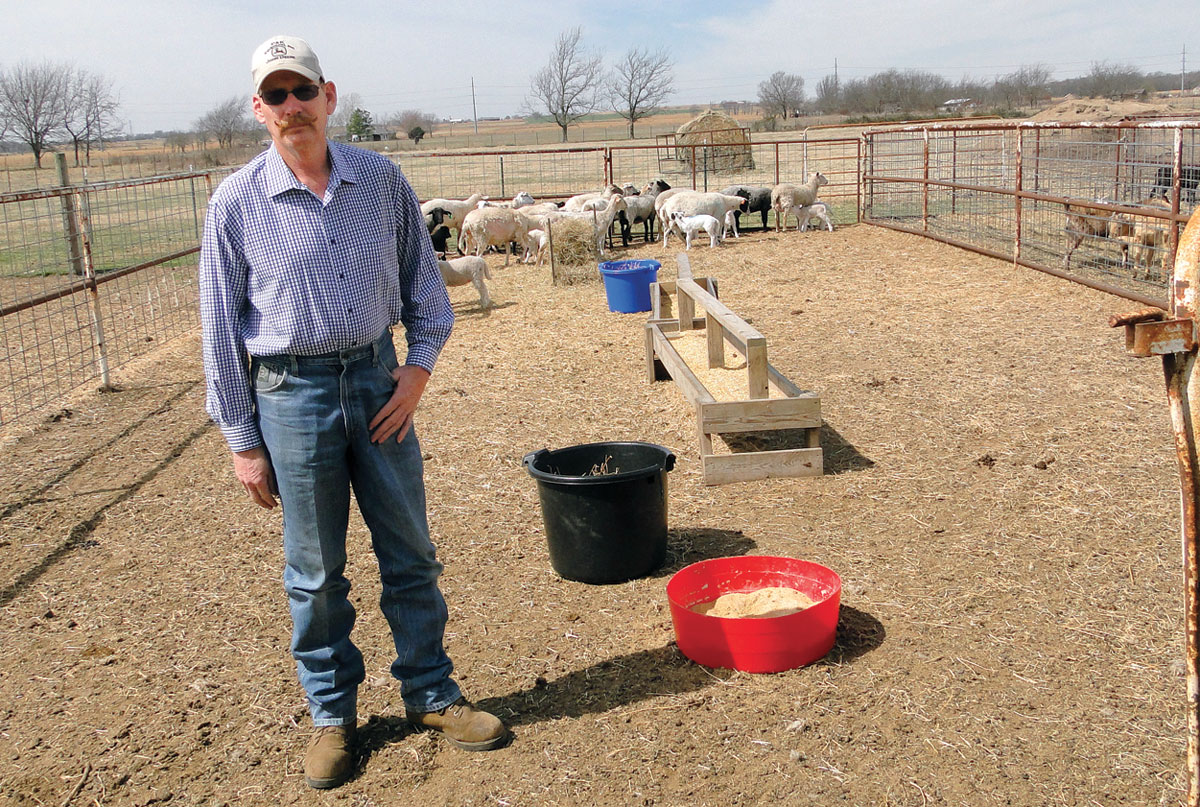 Russ and Marla Jones are partners with Marla’s parents Jerry and Shirley Green in a diverse, small acreage farming operation in Muldrow, Okla. The farm includes dairy goats, Boer goats, chickens, St. Croix hair sheep and Jersey cows that supply area residents with milk, milk products and meat. Other family members are also involved causing Russ to comment, “This is as communal as you can be in the United States without raising eyebrows. We all work together.”
Russ and Marla Jones are partners with Marla’s parents Jerry and Shirley Green in a diverse, small acreage farming operation in Muldrow, Okla. The farm includes dairy goats, Boer goats, chickens, St. Croix hair sheep and Jersey cows that supply area residents with milk, milk products and meat. Other family members are also involved causing Russ to comment, “This is as communal as you can be in the United States without raising eyebrows. We all work together.”
Russ explained that, like so many others during the 1980s farm crisis, the family had to go to work in town but were more fortunate than many because they didn’t lose everything. Much like their parents, Russ works out of Oklahoma City and Tahlequah, Okla., in quality assurance for Adult Protective Services by auditing cases, and Marla teaches social interaction skills to special needs people through Behavioral Rehabilitation Services. Marla is particularly grateful for the flexibility in her work schedule that allows her to put in extra time on the farm in addition to raising the children. Though the couple met when they were kids in 4-H, they have been married for only three years and have a blended family, which both Russ and Marla believe profits from the rural, self-sustaining lifestyle they are trying to achieve. Russ said, “The long term goal is to make the farm our livelihood, and if nothing else we save money by producing much of what we need while earning money from the farm.”
Russ pointed proudly to his goat-milking shed, which only cost him $12. He accomplished this by using materials reclaimed by brother-in-law, Marty Green. Russ said, “The best way to get ahead in farming is to be resourceful and use what you have rather than buying everything new. This milking shed is perfect for our needs.”
Maple Springs Farm sells a variety of products. According to Oklahoma law, they are allowed to sell up to 100 gallons of milk per species per month before needing a license. They currently are producing 25 gallons of goat milk per month and 50 gallons of cow milk. The family is particularly pleased with their Jersey cows because the butterfat content in the milk is so high. As a result they are able to process and sell whole cream, half-and-half, pre-whipped cream and whipped butter as well as milk. Unlike most store bought whipped butter, their butter is soft enough to spread right out of the refrigerator. The goat milk is also popular. Many people who have trouble with cow milk can tolerate goat milk because the fat molecules are more digestible. In fact, a neighbor’s child was born with a hole in his stomach and thrived on goat milk for seven months before being switched to formula. Goat’s milk is also reputed to help with arthritis and ulcers. The farm sells broilers that they buy as chicks. All chicken feed is natural rather than chemically enhanced. The family processes the meat themselves under government regulations. In addition they sell free range eggs from their laying hens.
Another plus for the Jones farm is that the Muldrow area has a substantial Hispanic population that consumes goat meat as one of their staples. Jewish and Muslim customers are especially prevalent during the holidays when they purchased both goat and sheep meat.
Maple Springs Farm does not advertise but rather depends on word-of-mouth. Russ said, “We can’t keep milk around because the demand is so high, and the customer always comes first.” One of the plans for the future is to increase milk production by this time next year to the point where they can use a Grade C license and sell to cheese manufacturers. They plan on expanding their milk goat herd by 50 to help meet this goal.
Other future plans include purchasing another 45 acres and developing a fryer market for their new rabbits. Another plan is to buy about 50 turkey chicks and have them ready to sell for Thanksgiving. The turkeys and chickens will be raised together but have separate feeding facilities with access to the outside.
As Russ was milking a goat he said, “I am a fifth generation farmer and the Jones name has always been associated with dairy. This is a picture of what we want to do for the rest of our lives.” Marla added, “I was raised with farming and can’t imagine being anywhere else.”







